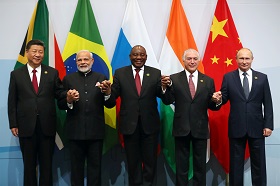The G20 is an important international forum, a meeting place for representatives of the world’s largest economies. Now, we can say that the division into the so-called “developed” and “developing” economies is irrelevant within this forum. Additionally, the G20 generally does, indeed, represent the interests of the global population, since its countries account for over 80 percent of the gross world product and two thirds of the entire population of the planet. It is also important to remember that such venues are very convenient for privately owned businesses, which, through the support of governmental agencies, can get favourable opportunities to hold talks with their foreign partners. Additionally, a rather large number of meetings and talks at G20 summits remains outside the spotlight, but their results confirm the significance of the many unofficial meetings, informal negotiations and talks on the side-lines of the summits. These meetings, which take place in a variety of formats, are vital for understanding the issues that are most important for leading international participants and whether there is consensus among them on the approaches required to resolve these issues. Moreover, as we consider meetings and agreements concluded on the side-lines of G20 summits, we can, to a degree, draw conclusions on the current configuration or re-configuration of international relations.
From the outset, we will note that the importance of G20 summits is gradually growing, even though they started out as meetings of ministers of finance and their initial goal was to formulate a joint response to global financial issues. Today, the summit has transformed into an international venue for discussing issues of global financial and economic policies and other pressing matters of the day. However, economic and financial issues remain significant for G20 discussions.
The summit is also important for the expert and political communities of various countries that assess the prospects of inter-country interactions. Apparently, at the Argentina summit, the meeting between Donald Trump and Vladimir Putin attracted the greatest interest, but it never happened, since the U.S. President cancelled it at the eleventh hour, which certainly demonstrates the growing tensions in U.S.–Russia relations.
At the same time, the summit is useful, since its function is not to settle bilateral relations, but to develop common approaches that satisfy different states with different economic indicators and representing different political regimes.
G20 summits are convened to discuss several pressing issues proposed by the presiding state.
The summit held in Argentina was devoted to building a consensus for fair and stable development. Face-to-face meetings between heads of state are particularly important for handling the task. The goal of the summit indicates that the global community is aware of the current tectonic shifts in the global economy and in world politics. For a full-scale scale discussion of the problem, four issues were put on the agenda: the future of work and new professions, infrastructure for development, sustainable food future and gender mainstreaming.
Clearly, the G20 is not just a venue for discussing issues that have been defined as key; it is also an opportunity to “compare notes” via different formats “inside” the summit. For instance, we can say that France, Germany, Austria and Italy did not represent themselves or their interests alone, but were also united by their common tasks as EU countries. In addition, as one of the world’s largest economies, the European Union is a member of G20 as a single body. At the present summit, the European Union was represented by the heads of the European Council and the European Commission, Donald Tusk and Jean-Claude Juncker. Similarly, BRICS countries use G20 to discuss issues of their own.
The G20 is an important international forum, a meeting place for representatives of the world’s largest economies. Now, we can say that the division into the so-called “developed” and “developing” economies is irrelevant within this forum. Additionally, the G20 generally does, indeed, represent the interests of the global population, since its countries account for over 80 percent of the gross world product and two thirds of the entire population of the planet. It is also important to remember that such venues are very convenient for privately owned businesses, which, through the support of governmental agencies, can get favourable opportunities to hold talks with their foreign partners. Additionally, a rather large number of meetings and talks at G20 summits remains outside the spotlight, but their results confirm the significance of the many unofficial meetings, informal negotiations and talks on the side-lines of the summits. These meetings, which take place in a variety of formats, are vital for understanding the issues that are most important for leading international participants and whether there is consensus among them on the approaches required to resolve these issues. Moreover, as we consider meetings and agreements concluded on the side-lines of G20 summits, we can, to a degree, draw conclusions on the current configuration or re-configuration of international relations.
From the outset, we will note that the importance of G20 summits is gradually growing, even though they started out as meetings of ministers of finance and their initial goal was to formulate a joint response to global financial issues. Today, the summit has transformed into an international venue for discussing issues of global financial and economic policies and other pressing matters of the day. However, economic and financial issues remain significant for G20 discussions.
The summit is also important for the expert and political communities of various countries that assess the prospects of inter-country interactions. Apparently, at the Argentina summit, the meeting between Donald Trump and Vladimir Putin attracted the greatest interest, but it never happened, since the U.S. President cancelled it at the eleventh hour, which certainly demonstrates the growing tensions in U.S.–Russia relations.
At the same time, the summit is useful, since its function is not to settle bilateral relations, but to develop common approaches that satisfy different states with different economic indicators and representing different political regimes.
G20 summits are convened to discuss several pressing issues proposed by the presiding state.
The summit held in Argentina was devoted to building a consensus for fair and stable development. Face-to-face meetings between heads of state are particularly important for handling the task. The goal of the summit indicates that the global community is aware of the current tectonic shifts in the global economy and in world politics. For a full-scale scale discussion of the problem, four issues were put on the agenda: the future of work and new professions, infrastructure for development, sustainable food future and gender mainstreaming.
Clearly, the G20 is not just a venue for discussing issues that have been defined as key; it is also an opportunity to “compare notes” via different formats “inside” the summit. For instance, we can say that France, Germany, Austria and Italy did not represent themselves or their interests alone, but were also united by their common tasks as EU countries. In addition, as one of the world’s largest economies, the European Union is a member of G20 as a single body. At the present summit, the European Union was represented by the heads of the European Council and the European Commission, Donald Tusk and Jean-Claude Juncker. Similarly, BRICS countries use G20 to discuss issues of their own.
G20 in Implementing Russia’s Strategic Tasks
Russia’s current strategic priority is to take part in the establishment of the concept of a multipolar world and in elaborating new principles of interaction within integration processes in Eurasia. Therefore, special emphasis will invariably be placed on the possibilities for implementing the idea of “integrating integrations” at G20 summits, and this summit was no exception. In particular, special attention was paid to mechanisms for connecting the development of the EAEU with the “One Road – One Belt” strategy. In addition, issues of stepping up cooperation within BRICS are also addressed, and there is an ongoing search for parties interested in bolstering global political and economic stability through the instruments of “integrating integrations,” which entails Russia paying attention to China, India and other Asian partners, as well as the gradual stable growth of Russia’s interests in Latin America.
As for meetings that have the greatest significance for Russia, the key talks for understanding the development of Russia’s foreign policy are the now traditional sessions held with BRICS countries. In addition, a meeting was also held between the heads of state of Russia, India and China (in the RIC format). Objectively, this format could be the most efficient, since interaction between Eurasia’s three largest states is of principal significance for both regional and global security. The dialogue on security issues and collaboration in all areas will be continued at the second Belt and Road Summit in April 2019 that Xi Jinping invited Vladimir Putin to attend.
The President of the Russian Federation was probably one of the most active figures at the present summit. Naturally, he had a meeting with representatives of Argentina. It is all the more important today since the EAEU and MERCOSUR are building up their cooperation potential, and a Memorandum on Cooperation is being prepared. What is more, Russia and Argentina concluded an agreement on nuclear power generation that will allow Russia to start construction of Russian-designed nuclear power plants in Argentina.
The main topic of discussion at the meeting between Chancellor of Germany Angela Merkel and Vladimir Putin was the Syrian agenda. Indeed, an exchange of opinions on this question now, when various formats of building up the peace process are being discussed, is of particular importance. In addition, the President of the Russian Federation discussed the current situation in Syria with his Turkish counterpart, President Recep Tayyip Erdogan, who also confirmed the significance of the Turkish Stream for the stable and secure development of the economy of Turkey and other states.
The meeting between the President of the Russian Federation and Saudi Arabia’s Crown Prince Mohammed bin Salman focused on energy issues, with the two parties agreeing to extend the agreement on cutting oil production.
Vladimir Putin also met with Prime Minister of Japan Shinzo Abe, with the Japanese side raising the issue of concluding a peace agreement. For Russia, the issue is not particularly relevant anymore, and at the meeting, the two heads of state agreed to continue active cooperation to increase the level of mutual trust between the two sides.
Of course, a great number of people were interested in the informal conversation between Vladimir Putin and Donald Trump, who only had time to exchange opinions on the “Kerch Strait incident.” Trump’s refusal to meet with the President of the Russian Federation means a further loss of confidence between the two countries.
On the whole, meetings between heads of state were of particular importance at the summit, since, for instance, the meeting at the level of ministers of foreign affairs was downsized due to the absence of Russian and French ministers of foreign affairs, the U.S. Secretary of State and the High Representative of the Union for Foreign Affairs and Security Policy.
G20: The International Agenda
The so-called Iran nuclear deal has become one of the most crucial problems in international relations. Russia and the European Union have adopted the same stance on this issue.
In addition to economic matters, G20 also tackled the climate change problem and proposed complete and utter compliance with the decisions of the Paris Agreement on climate change. However, significant progress is unlikely after the withdrawal of the United States from the accord.
No less important were the discussions on the problem of terrorism. The G20 countries agreed that their Leaders’ Hamburg Statement on Countering Terrorism needed to be implemented. Incidentally, that statement declared the need to fight terrorism internationally in all its forms and manifestations. However, the current situation is extremely complicated, and discussions concerning Syria confirm this fact.
The influence of the European Union and the United Kingdom on the international security agenda and their claim that Russia is the main disrupting force are just as worrying. The European Union, in the person of Donald Tusk, sought to expand the summit’s agenda with a discussion of Russia’s so-called aggression against Ukraine, which he likened to the problem of trade wars. However, despite the suggestion put forward by both Tusk and the United Kingdom that the G20 discuss Russia’s allegedly impermissible conduct and use some instruments against it, the proposal failed to gain traction. It say a lot that the “Kerch Strait incident” did not overshadow any of the meetings held by the President of the Russian Federation at the G20 Summit.
The attention of international actors was also focused on the meeting between Donald Trump and Xi Jinping, who failed to achieve a consensus on economic interaction, but agreed to a 90-day moratorium on introducing increased tariffs. Accordingly, special hopes are pinned on this interim measure. Clearly, China will not make the unilateral concessions that the United States is calling upon it to do, appealing instead to the idea of a compromise.
Results of the G20 Summit
While the summit’s final declaration does not contain specific figures and objectives for the most sensitive issues on the agenda, it does offer mechanisms for their resolution. In this respect, the summit did not turn out to be a breakthrough in resolving pressing issues. However, it demonstrated that no issue will ever be resolved if the parties abandon dialogue and compromise.
The results of Russia’s efforts at the summit include the signing of a large set of bilateral agreements between public and private bodies. The summit also demonstrated that Russia is actively and successfully stepping up cooperation with Latin American countries and enhancing its multi-format collaboration with the BRICS nations, particularly with China and India.
It is both curious and telling that the media was most interested in the meetings held by Vladimir Putin, Xi Jinping, and Donald Trump. However, we should mention the different approaches of these heads of state. For example, the President of the United States demonstrated that his country was not especially interested in following the established rules and was far more concerned about retaining the right to develop new rules of the game independently of other participants in international relations. Meanwhile, China’s and Russia’s leaders spoke about cooperation and compromise both in their joint meetings held in various formats and in their conversations with other heads of state. Additionally, the fact that the world is changing rapidly was recognized at the summit, meaning that the rules of the game can and should be changed and that new rules need to be formulated, but only through collaboration and compromise.
The heads of state also appealed to the IMF and the World Bank to work towards improving the economic situation in various countries and increasing the transparency of their work in interacting with states. This should help reduce sovereign debt and ensure that the recommendations offered by international financial institutions in individual states are implemented more effectively.
In addition, the leaders of the G20 countries concluded that responses need to be developed to current and future challenges in the development of the WTO and attempts should be made to avoid excessive contradictions, sanctions and tariff restrictions. The parties also agreed that the WTO needs to be reformed for it to work more efficiently. This aspect will be considered at the next summit in Japan.
Interestingly, virtually all countries supported multi-laterality, confirmed their commitment to the rules of international trade and agreed that efforts to overcome crisis trends in the global economy should be stepped up in order to avoid a repetition of the 2008 global crisis. The final declaration states that the global economic growth is increasingly less synchronized between countries, which entails risks to economic security, particularly given geopolitical tensions and financial unpredictability. To overcome this problem, it is important to step up interaction and increase trust among all parties in international relations.
The G20 states also announced that it was necessary to continue joint work on studying the impact that the digitalization of economy has on the global tax system, which needs to be adapted to current conditions by 2019 (final decisions on the matter will be elaborated and published in 2020).
Thus, the G20 Summit in Buenos Aires once again demonstrated the significance of the mechanisms of dialogue and achieving compromise based on constant information exchange between countries. The compromise-based approach was officially adopted as the foundation of all agreements, and was the leitmotif of the event. Given the circumstances, an increasing number of states recognize their significance as participants in international relations and, with each passing year, they strive to more forcefully state their stance on the most sensitive issues. Clearly, the Russian Federation wholeheartedly welcomes this trend.
Therefore, it should be noted that the recent summit in Argentina demonstrated that the G20 is just that – a group of countries – and not a political club. This fact increases its significance as an organization exhibiting a multilateral, multi-format and pluralistic nature of today’s international relations. Active discussions in such a format confirm the relevancy of multipolarity and the current processes of reconfiguring the world. In such circumstances, Russia can most fully implement its interests and convey its vision of international matters. An analysis of the volume of news reports in the European media is quite telling in that it proves that EU journalists were primarily interested not so much in meetings of heads of EU states, but in meetings with the participation of the leaders of Russia, China and the United States, meaning that EU representatives were running second in the newsfeeds of many news agencies. Thus, the results of the summit allow us to state that there has been a significant increase in the international community’s attention on Russia.







